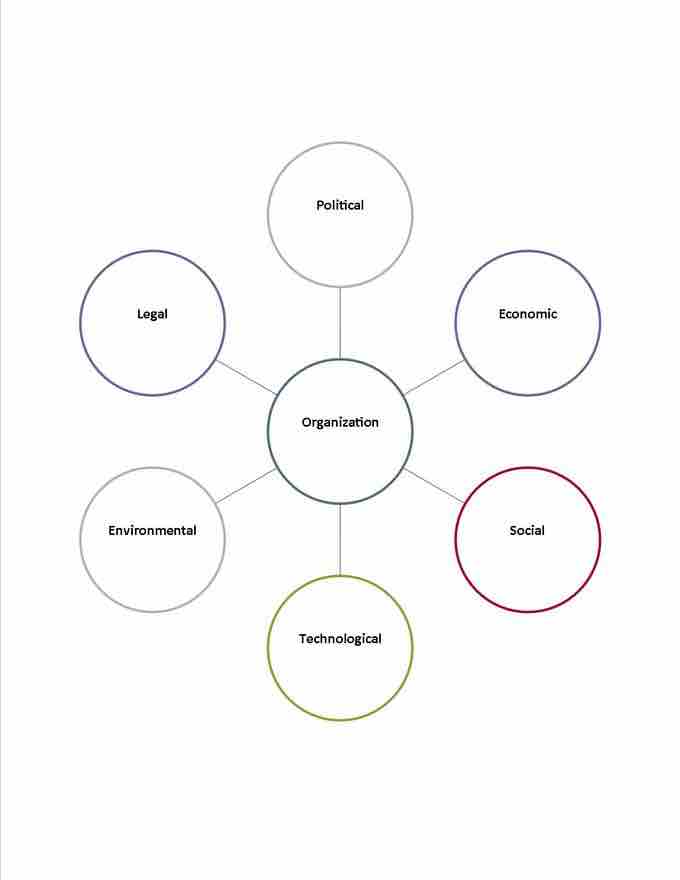Organizations are faced with a variety of external factors that provide potential opportunities and threats for short-term and long-term success in any given environment. Encompassing a macro-environmental perspective, these factors can be effectively summarized with the acronym PESTEL.

PESTEL Analysis Diagram
This chart illustrates the PESTEL factors an organization faces.
PESTEL stands for the political, economic, social, technological, environmental, and legal influences a businesses encounters as it pursues its objectives. Analyzing the entirety of the macro-environment is an extensive and complex task, but understanding the framework of basic influences allows for an organized and strategic approach to isolating each opportunity or threat. It is common to conduct a PESTEL assessment before any serious decisions are made or any large projects undertaken. Understanding each of these influencing factors is the first step to addressing them properly.
Political
Politics play a role in business, as there is a balance between free markets and systems of control. Political factors affecting business specifically revolve around taxes, import and export tariffs, environmental and labor laws, potential subsidies, and the stability of a given operational region. As global economics now supersede domestic economics for many businesses, companies must consider a number of opportunities and threats when expanding into new regions or identifying optimal areas for production, sales, or corporate headquarters.
Economic
Economic factors are metrics that measure and assess the health of a given economic microcosm within the entire global economy. These factors incorporate exchange rates, gross domestic product (GDP), consumer purchasing indices, interest rates, inflation, and a number of other indicators of economic health or direction. These indicators are critical to management, as they can reveal a good time to borrow, as well as whether an economy will be friendly to an industry where businesses fluctuate substantially with GDP or spending power, etc.
Social
Social factors could loosely be defined as a demographic analysis, where specific groups display preferences or tendencies that can be leveraged or that can threaten a given incumbent. For example, in the United States, consumers are becoming more health-conscious. This trend affords the food industry opportunities to create products that meet this social desire; as a result, candy manufacturers may want want to consider diversification. The social movement of living "green" is another example of this kind of macro-environmental opportunity or potential threat.
Technological
Technology plays a larger and larger role each year in business and will continue to do so as research and development drive new innovations. Recognizing the potential technologies available to optimize internal efficiency is a powerful asset in management. Technology also presents a number of threats, as CD-player manufacturers and Blockbuster Video can attest. These companies were hurt by "disruptive innovations" such as the MP3 player and Netflix. Keeping pace with technology and adapting accordingly are important strategies to sidestep threats and embrace opportunities.
Environmental
The impact of business upon the environment is a growing concern, and companies must consider both the social and political segments of PESTEL in conjunction with environmental factors. Consumers and governments both penalize companies that adversely affect the environment. Governments levy enormous fines upon companies that pollute beyond given specifications, and consumers are more than willing to switch brands if they perceive that a business is ignoring its environmental responsibilities. The environment can also be a source of benefit to a company, such as running water for a hydro-power plant.
Legal
The last factor in PESTEL concerns legal elements, which can also be tied to the political framework. Legal issues such as affirmative action, patent infringements (a recent example being Apple vs. Samsung), antitrust laws (see Microsoft), health regulations, and safety regulations can all significantly affect a company that does not act responsibly. Understanding this legal landscape is important for businesses that want to avoid legal pitfalls and remain within the confines of established regulations.